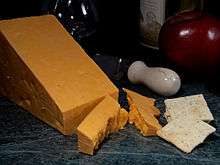Red Leicester
Red Leicester (also known simply as Leicester or Leicestershire cheese)[1] is an English cheese, made in a similar manner to Cheddar cheese, although it is crumbly in texture, and typically sold at 6 to 12 months of age. The rind is reddish-orange, with a powdery mould on it. Since the 18th century, it has been coloured orange by adding annatto extract during manufacture.[2] It is a cow's milk cheese, and is named after the county of Leicestershire, in England. Traditionally-made wheels are fairly firm and dry, with a friable texture and a slightly sweet, mellow flavour that becomes stronger as the cheese matures. Block-made cheeses are moister, and have a slightly sweet aftertaste and a creamy texture.[3] The cheese has a slightly nutty taste. Versions sold in supermarkets are typically coloured with annatto, although it is possible to obtain Red Leicester without it.
| Red Leicester | |
|---|---|
 | |
| Other names | Leicester |
| Country of origin | England |
| Region | Leicestershire |
| Source of milk | Cattle |
| Pasteurised | Frequently |
| Texture | Hard |
| Fat content | 33% total (48% as FDM) |
| Aging time | 6 to 12 months |
Although Red Leicester can be young or "old", aged anywhere from four to nine months, young Leicesters at the beginning of that range will be very mild: they often require at least six months to develop a tang. Farmhouse versions are also available. Farmhouse makers mature it in cloth (the old way) to allow better flavour development, whereas modern cheese makers use Vac-Pac to age Red Leicester.
History
The cheese was originally made on farms in Leicestershire with surplus milk, once all the Stilton desired was made. It was originally coloured with carrot or beetroot juice.
It used to be called Leicestershire Cheese, but came to be called Red Leicester. This was to distinguish it from "White Leicester," which was made to a national wartime recipe in the 1940s, due to rationing.[3]
When fresh, the fat content of Red Leicester cheese is generally 33 to 34%. Regulations require that minimum fat levels to be stated in terms of the "fat in dry matter" or FDM. This is because moisture levels decrease as cheese ages. FDM measures the amount of fat present in the solids, which includes protein, minerals, vitamins and salt. The minimum FDM listed for Red Leicester is generally 48%.
References
- "Red Leicester". BBC Online. Retrieved 7 May 2013.
- "History of Red Leicester". britishcheese.com. British Cheese Board. Archived from the original on March 18, 2016. Retrieved February 22, 2018.
- "Red Leicester". britishcheese.com. British Cheese Board. Archived from the original on November 14, 2017. Retrieved February 18, 2018.
External links
- Red Leicester at Cheese.com